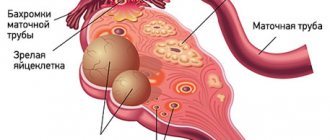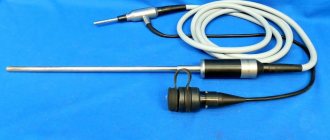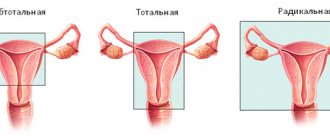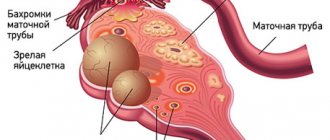Laparoscopy and IVF surgery
Laparoscopy is a minimally invasive surgical procedure that allows the doctor to visually assess the condition of the organs being studied and, if necessary, perform surgery.
At the moment, laparoscopy is the “gold standard” for the diagnosis and treatment of a large number of gynecological diseases.
Make an appointment
Features of the procedure
Laparoscopy is a procedure that is performed using special microsurgical instruments and an optical system. It involves the penetration of a laparoscope into the abdominal cavity through incisions of minimal length.
There are diagnostic and surgical options for this intervention. The first, if necessary, can move into the second.
During laparoscopy, the following diseases can be treated:
- Endometriosis.
- Adhesive process.
- Cystic lesion of the ovaries.
- Myomatous nodes.
Laparoscopy is currently a very popular method in the diagnosis and treatment of gynecological diseases. The high safety and effectiveness of the procedure determine its popularity among doctors. Laparoscopy is characterized by low trauma, low risk of complications, and rapid rehabilitation of the patient after surgery.
IVF and laparoscopy surgery
Laparoscopy before IVF in some situations can be a factor that significantly increases the chance of a successful conception. There are a number of situations when this operation is justified. These are:
- Adhesive processes in the pelvic area.
- Endometriosis of various localizations.
- Formation of neoplasms in the pelvis.
- Inflammation of the fallopian tubes.
- Cystic lesion of the ovaries.
These pathologies require laparoscopic surgery. IVF without prior surgical intervention may be unsuccessful, or the pregnancy may be terminated.
A woman should decide whether to undergo laparoscopy before IVF after consultation with a doctor. A reproductive specialist will be able to explain all the features of a specific clinical situation and suggest what to do correctly to increase the chances of a successful procedure.
If the doctor predicts that IVF without laparoscopy is likely to be ineffective, he will prescribe surgery. Only after treatment and completion of a rehabilitation course will a woman be able to enter into the protocol.
Advantages
Laparoscopy is one of the most popular treatment methods in modern gynecology. With the help of this operation, the diagnosis and elimination of many pathologies is carried out. With the development of medicine, this operation is becoming increasingly safer for the patient.
The main advantages of laparoscopy are:
- Low morbidity.
- Speed of the procedure (on average lasts 30 minutes).
- Visual inspection by a doctor. As a result, there is a minimal risk of damage to healthy tissue.
- Fast rehabilitation.
- Good aesthetic effect.
As a diagnostic method, laparoscopy has the greatest information content compared to other techniques.
IVF or laparoscopy?
In some situations, a woman is faced with a choice: laparoscopy or IVF. This is possible if conception naturally is impossible without surgical intervention, but a high chance of pregnancy is predicted after in vitro fertilization. In this case, the woman chooses, weighing all the pros and cons.
Advantages of laparoscopy:
- Natural fertility is restored.
- The price is lower than IVF.
- You don't need your husband's participation.
Disadvantages of laparoscopy:
- The need for surgery (possible: risk of complications, postoperative pain).
- You can become pregnant after surgery not immediately, but after some time.
- Fertility may not be restored, and then IVF will still have to be done.
Disadvantages of IVF:
- Natural fertility is not restored, but pregnancy is only achieved.
- Higher price.
- The participation of the husband is required (he also needs to undergo an examination and also donate sperm for fertilization).
Benefits of IVF:
- You can start the procedure immediately if there are no contraindications.
- Safety (with proper examination and correct selection of ovarian stimulation regimens).
- High efficiency.
IVF after laparoscopy
Almost all patients who decide to undergo this operation immediately ask how long it takes to do IVF after laparoscopy. They want to know how quickly they can get pregnant.
It is impossible to give a definite answer. In each case, everything is individual and depends on quite a large number of factors.
When IVF is possible after laparoscopy is influenced by:
- The severity of the pathology.
- Features of the disease that was eliminated surgically.
- General condition of the patient.
- Woman's age.
- Presence of concomitant pathology.
- Individual characteristics of the body.
In some cases, IVF is allowed to be performed as early as 2 months after surgery. In other situations you have to wait longer. If laparoscopy was performed, only your attending physician will tell you how long it will take to do IVF.
Who got pregnant after laparoscopy? Please respond!
Who had the white membrane removed during laparoscopy? Who got pregnant? After today's appointment, I really doubted the doctor. She says that there is no need to track anything, I am healthy, the membranes will not return, the main thing is not to push yourself, not to think, not to bother, and everything will work out by itself. The doctor refuses to monitor the growth of follicles and ovulation itself using ultrasound.
I'll tell you a little more. My G sent me for laparoscopy. My husband’s SG was not ideal, but the andrologist said “they can get pregnant like that.” The doctor who performed the laparoscopy and the head. The department said that after laparoscopy I have about 6-12 months to conceive, then the membranes may return. They advised to immediately send my husband for a repeat SG and if there were any comments, immediately begin treatment. My G said that there is no need to pull my husband further, FH is more or less normal, so first you need to try to get pregnant for several months after laparoscopy, if you don’t succeed, then think about something further. I listened to her. In the first cycle after laparoscopy, she told me to monitor with tests and that’s it. In the second cycle after laparoscopy, the doctor prescribed an ultrasound at 14 dc, they saw a 15 mm follicle and an 8 mm endometrium. She said that everything was fine, there was no need to take any pills, and there was no need to track O anymore either. And in the third cycle she says to give her husband the SG. Not everything is perfect there either, increased viscosity, liquefaction 37 minutes, mobility 40%, active mobility 15%. He says that it seems normal, but he will keep the result and consult with an andrologist. When I ask what I should do, she says to free my head, get distracted, etc. I ask her about follicolometry, ultrasound tracking, she says “you’re fine, you’re healthy, we’ll sort it out with your husband, don’t worry, membranes on your ovaries won’t appear again, you have plenty of time.” I tell her that I may not have O, and maybe I should check for hormones, because I’m in the second phase for a maximum of 10 days, but she tells me that I’m already driven, I’ve come up with a bunch of things for myself and I’m putting a block on myself. Like this.
I left her with tears streaming down my face. Well, how is that? When the surgeons said to check my husband, she said that everything was fine with him, we’ll deal with me, but now she says that everything is fine with me, the problem seems to be with my husband, and for now we’ll deal with him. What the fuck is this anyway? Is it really impossible to get some kind of parallel treatment? Why doesn’t my G understand that if I track O using an ultrasound, it will be easier for me? She says that O exists anyway, there is no need to track her using an ultrasound, but how does she know this, since she has never seen it herself?
Oh, sorry for the confusion, apparently I just need to talk...
In general, my question is this: has anyone gotten pregnant after laparoscopy specifically to remove the dense membranes on the ovaries, stupidly ignoring all the ultrasounds and tests and living an ordinary life? If not, how and how long did it take to get pregnant?
How long did it take to become pregnant after laparoscopy?
The story is long, I apologize in advance. Planning B 2 years. For 7 years I went to the same doctor. I trusted her and thought that if something bothered her, she would refer me for Aliza and an ultrasound. But apparently the doctor was happy with everything... I came, paid money for the appointment. B doesn’t come (I take vitamins). The doctor says you’re not trying hard. In general, I decided to use an ultrasound to catch Oh, I made an appointment, came to the appointment, the ultrasoundologist looked and said oh, yes, you are all stimulated and everything does not correspond to the day of your cycle (hmm, interesting, I didn’t take anything other than vitamins and I never even took birth control pills ). I go to G with these results, she laughs and says yes, our ultrasound specialist is stupid... don’t go to her. And he prescribed me Duphaston with the help of a calendar, determines the day on which to start drinking them and lets me continue to try in peace.
I’m going to another clinic to do a full ultrasound, to be calm that everything is as it should be for me, and what a shock, they tell me that I have an endometrioid cyst on my left ovary (large). Shock. I go to see G, she tells me, oh, just think, they get pregnant with her and that’s okay, we need to try harder (the best way, if almost a year has been all over the place) And the question is why she never told me about the cyst at the appointment. My husband's spermogram is perfect. In general, I believe G again, I go for foliculometry, the ultrasound doctor groans at the size of the cyst, but there is a domain follicle, he says to come in 2 days. after the ultrasound I drink duf, that’s what doctor G told me (oh, if only I knew that there was no need to do this... I’ve been drinking it for 4 months already...) I come for the ultrasound and the doctor says Oh it never happened, what?? why?? Then they told me that they drink duf after O.. but for me it hasn’t come yet, and after drinking duf, he didn’t let it come. I come home all in tears. My husband is looking for a fertility specialist. They came, she looked and said no duf. I need lapra because the cyst is large. Prescription of Visanne for 3 months. See if the cyst has dynamics. I drank it, it decreased, but as soon as I stopped drinking, it immediately began to increase in size. They did lapra and saved the ovary. They said in a month we can start planning. If it doesn’t work out in half a year, you’ll have to go to AI. And now the 3rd cycle has passed (a month is divided into planning and waiting..). The new cycle has not yet begun, but I understand that the passage (a week before M I felt a strong tug in my stomach, as if it was about to begin.. upset.
Tell me, who managed to get pregnant and give birth after removal of an endometrioid cyst? And after how long?
Endometriosis and infertility - IVF or Laparoscopy?
In vitro fertilization March 19, 2018
Patients who are faced with endometriosis and infertility associated with it often do not know who is better to consult with first: a gynecologist or an infertility specialist?
Most gynecologists recommend laparoscopy. They justify the need for such intervention by the fact that the only way to make an accurate diagnosis of endometriosis is laparoscopy. In addition, the patient is assured that the surgery will “cure” endometriosis. Many women easily agree to laparoscopy, which is billed as “minimally invasive surgery,” with no visible scars and a short hospital stay. Unfortunately, endometriosis often returns after surgery! Moreover, surgery can cause infertility because too much healthy ovarian tissue is sacrificed during the procedure, which leads to a decrease in ovarian reserve. Thus, the fertility problem (which is already a big one) gets worse.
If these women see a fertility specialist first, they will be advised to use IVF and forego laparoscopy. And at such a moment, women feel disoriented and confused, because IVF does not cure endometriosis and has no effect on treatment.
Then why should you first choose the IVF procedure rather than laparoscopy?
When making decisions, consider at least the following key points:
- Age;
- Ovarian reserve;
- The degree of endometriosis, how extensive the disease is;
- Having symptoms other than infertility (for example, pelvic pain);
- Period of infertility;
- The existence of other problems in the couple that may aggravate infertility (make sure that you do not have problems with the uterus, fallopian tubes or that your husband has high-quality sperm). If one of these pathologies is present, laparoscopy will not help you get pregnant.
The older you are, the more valuable time is, and you need to look for the most effective treatment to get pregnant as soon as possible. This also applies to women with a low supply of eggs, for whom surgery will further worsen the condition. But even women with a good supply of follicles should carefully consider the risk of losing their supply of eggs as a result of laparoscopy.
IVF not only increases a woman's chances of pregnancy. Pregnancy itself causes regression in the development of endometriosis and easing of pain.
If you have symptoms of endometriosis that significantly reduce your quality of life and require treatment (for example, pain during sex), then laparoscopy may be the first choice because it can effectively eliminate these painful lesions and lead to improvement.
Attention! If pregnancy is the primary goal and a diagnosis of endometriosis is tentative (for example, based on a routine vaginal ultrasound), then your priority should be to maximize your chances of having a baby through assisted reproductive technology.
Ovarian reserve is the most important factor.
Many women, unfortunately, like most gynecologists, do not do follicular reserve research! Gynecologists are too focused on “treating the pathology” that they accidentally noticed on an ultrasound scan, or already during laparoscopy performed for certain indications. Often, a woman’s fertility is not assessed in time and is done when it may be too late - after surgery.
You should insist that your doctor check your ovarian function before you begin treatment. Assess the number of antral follicles to find out how much normal ovarian tissue is in your ovary (by transvaginal ultrasound from a fertility specialist) and by testing the level of AMH hormone (Anti-Mullerian hormone) in the blood. These tests are run together to eliminate error.
If you have a good number of antral follicles and normal AMH levels, you may be able to undergo surgery. You need to make sure that the surgeon is experienced and understands that you want to maintain your potential to give birth in the first place. But even in the most experienced hands, you run the risk of being left with a reduced ovarian reserve. Please take this information seriously before you decide to undergo laparoscopy.
If you have a low follicle supply, surgery may not be the right choice as it may compromise your ovarian supply. The correct option is IVF treatment. In fact, this is the right decision, whether you have endometriosis or not!
Don't forget about post-op recovery time!
The results of the operation can not only be unpredictable, but also a waste of time. It’s good if a woman manages to get pregnant 6-12 months after laparoscopy, but what if not? You will turn to IVF, but your chances are lower (more age and less ovarian reserve). Don't forget to consider all the pros and cons when choosing a treatment!
Laparoscopy for the treatment of endometriosis does not increase the chances of success with IVF fertilization - and may even significantly reduce it!
ASRM (American Society of Reproductive Medicine published an opinion on endometriosis and infertility - Fertility and Sterility®, 2012) and ESHRE (European Society of Human Reproduction and Embryology - published a work on the same topic in 2013) presented expert opinions on the treatment of women with infertility, associated with endometriosis:
- Resection (or removal) of endometriomas before IVF does not increase women's chances of success when planning a pregnancy;
- Endometriosis surgery may reduce ovarian reserve and compromise response to subsequent stimulation;
- Laparoscopy is not recommended for mild/moderate endometriosis if the only goal is to improve fertility (in young women, waiting or a course of intrauterine insemination is acceptable, and after 35 years, more aggressive tactics are recommended - several cycles of ovarian stimulation with intrauterine insemination, and then IVF , or immediately IVF)
- For women with stage 3/4 endometriosis, conservative surgery may be helpful, but if pregnancy does not occur, IVF is used immediately;
- When developing treatment tactics, one should take into account the woman's age, period of infertility, stage of endometriosis, pain in the pelvic area, and other factors of infertility (for example, abnormal spermogram).
New diagnostic options, such as high-resolution transvaginal ultrasound, may lead to erroneous decisions and unnecessary interventions for some patients. During a routine pelvic scan, small ovarian cysts (1-2 cm) may be diagnosed and interpreted as possible endometriosis, which can cause panic for the patient (and some doctors). The truth is that most of these “abnormalities” do not require treatment, and only their systematic monitoring is the best option.
Your main goal is not to “cure” endometriosis, but to have a baby.
The rule is simple - think not only about endometriosis, its diagnosis and treatment, but also about your ovarian reserve and the ultimate goal - having a child. The solution to “bypassing” the problem of endometriosis may be the most correct one.
All information is presented for informational purposes only. Please speak with a fertility specialist to develop the most appropriate solution for your situation.
Consult a fertility specialist at Medpark Clinic for free!
Postoperative period
After the operation, the patient remains in the hospital for no more than 1-3 days. Physical activity should be increased evenly, starting with walking, and heavy lifting should be avoided. It is not recommended to consume heavy foods and alcoholic drinks for 2-3 weeks. It is worth postponing sexual intercourse for 3-4 weeks to avoid infection in the body. If all recommendations are followed and the recovery period passes without complications, pregnancy may occur in the coming months after laparoscopy.
Indications for laparoscopy during pregnancy
The operation is prescribed if the patient has been given one of the following diagnoses:
- obstruction of the fallopian (uterine) tubes;
- endometrioid disease (endometriosis);
- fibroids (uterine fibroids);
- ectopic (ectopic) pregnancy;
- ovarian cyst.
During laparoscopic surgery, surgical instruments and an optical device, the laparoscope, are inserted into the patient's abdominal cavity through small punctures. A laparoscope allows you to see a magnified image of internal organs on a screen. In order to raise the abdominal wall and provide a better view, carbon dioxide is pumped into the abdominal cavity, which is completely harmless to the body. This type of surgical intervention is low-traumatic and in most cases occurs without complications, so the chances of pregnancy after laparoscopy are high.










